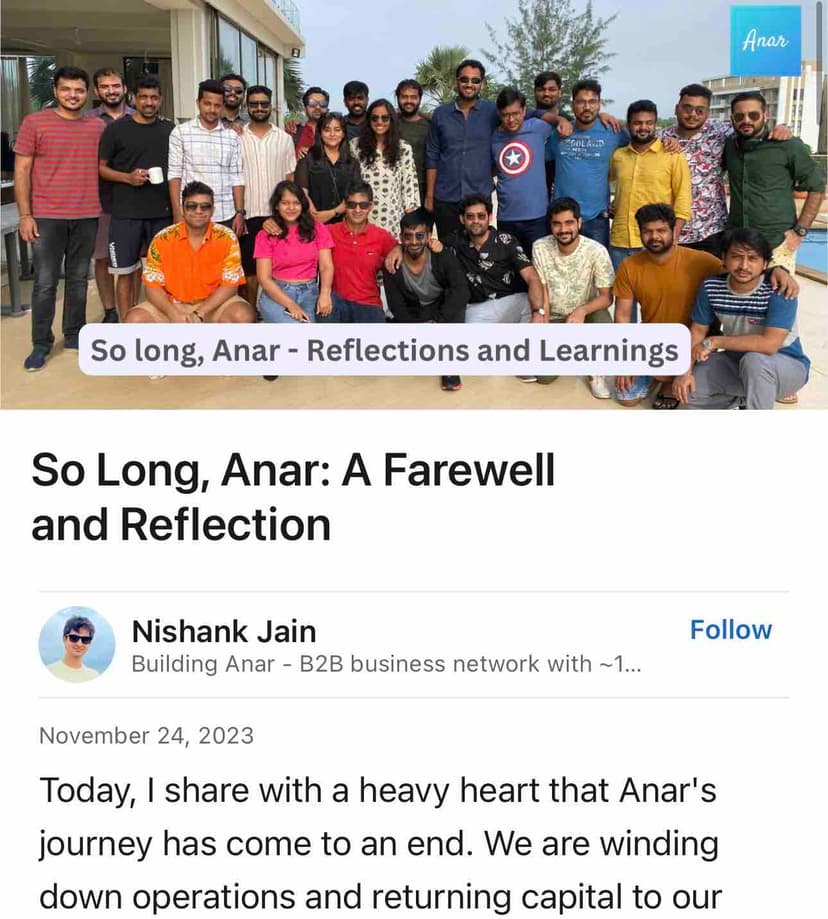I'm the founder who "Left a ₹50L+ job. Raised $2M. Built something profitable. Shutting it down now." 👋🏼
My last post went viral - so much so that it came back to me through my first cousins who have just started their professional journeys haha. Since I’ve somehow become the guy who overshares his startup journey, here’s another take, this time about venture capital funding and why it deserves more credit than it gets.
There’s a weird tendency in the startup world to glorify bootstrapping while looking at VC funding like it’s some necessary evil or a shortcut that “real founders” wouldn’t take. Honestly, that narrative needs to stop. Raising venture capital wasn’t just a good decision for me; it was one of the best decisions I made as a founder.
When I raised that $2M, it wasn’t because I couldn’t bootstrap. I could’ve slogged it out, sure. But bootstrapping often means slow progress, compromises on quality, and stretching yourself thin just to survive. With venture funding, I didn’t have to choose between building a half-baked product and blowing up my savings. I could hire the best talent, build something truly polished, and execute at a speed that wouldn’t have been possible otherwise. More than anything, it bought me time - the one resource no founder ever seems to have enough of.
You hear a lot of horror stories about VCs pushing founders to burn cash recklessly or chasing unsustainable growth. My experience couldn’t have been further from that. My investors were amazing - they believed in me, supported me when things got tough, and pushed me to make better decisions. But here’s the thing: I made sure to pick the right investors. They do reference checks on you, and you should absolutely do the same on them. It’s not just about the money; it’s about finding partners who align with your vision and values.
That said, venture capital isn’t a magic wand. It’s not going to fix your product-market fit issues or make you fall in love with a problem you’re not passionate about. And it’s definitely not going to make the grind of building a company any easier. If anything, it comes with added pressure, because now you’re accountable to people who are literally betting on your dream. That’s why it’s so important not to oversell. Don’t pitch a billion-dollar vision unless you’re truly ready to deliver on it. The money isn’t “free,” but it’s not a trap either - unless you make it one by overpromising.
I also don’t get why bootstrapping is treated as the ultimate badge of honor. Yes, it has its perks, like full control and no outside pressure. But it also means slower growth, higher risk, and a lot of missed opportunities. VC funding, on the other hand, can help you build in months what might otherwise take years. Of course, it comes with expectations, but that’s not a bad thing. If someone’s investing in your dream, the least you can do is work toward delivering on it.
Zerodha, bootstrapped, took 15 years to build, while Groww, with VC funding, achieved scale in 8 years i.e., half the time period - what defines the "right" path in this case?
The VC ecosystem isn’t broken. What’s broken is the way we talk about it, as though it’s a shortcut or a compromise. For me, it was a tool that amplified my vision and allowed me to execute at a level I couldn’t have reached otherwise. It’s not for everyone, but neither is bootstrapping. Both are valid paths, and it’s up to founders to choose the one that works for them.
Personal Update: I took an acquisition offer - not the highest bid, but the right one. It let me offboard in three months, ensuring the team and product are in good hands. After years of highs and lows, I knew it was time. Some team members are staying on, while others leave with a meaningful ESOP payout. Now, I’m stepping back to reflect, recharge, and figure out what’s next. Bittersweet, but proud of what we built :)
tl;dr - Whether you’re bootstrapping, raising capital, or still figuring it out, just remember - there’s no one-size-fits-all path. Build in the way that works for you. And don’t let anyone tell you otherwise.













